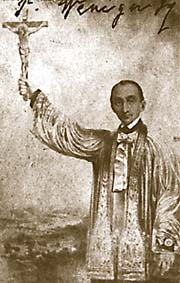Franz Xaver Weninger
Franz Xaver Weninger (born October 31, 1805 at Wildhaus Castle, Lower Styria , Austria (today part of the village of Selnica ob Dravi in Slovenia ); † June 29, 1888 in Cincinnati , Ohio, USA) was an Austrian Jesuit , spiritual writer and people's missionary , which worked mainly among the German-speaking immigrants in the USA.
Live and act
youth
Franz Xaver Weninger was born at Castle Wildhaus an der Drau (today Viltuš) in Lower Styria. His mother was aristocratic, so the family had contacts with the Austrian imperial court. He grew up mostly in Vienna and attended grammar school there. Originally, the young man wanted a military career, but his father decided that he should study pharmacy and sent him to a pharmacy in Ljubljana for training . Weninger enjoyed the protection of Empress Karoline of Austria , a born princess of Bavaria who was very charitable and religious. It enabled him to study at the University of Vienna and gave him admission to the so-called “Klinkowstöm Institute”, a renowned, decidedly Catholic school convent . The home manager Friedrich August von Klinkowström (1778-1835) was a convert and belonged to the circle around Saint Klemens Maria Hofbauer ; his son Georg Ernst Joseph Maria von Klinkowström (1813–1876) became a Jesuit.
Secular priest
At the age of 17, Franz Xaver Weninger decided to pursue a spiritual career. He had already studied philosophy, now dogmatics and moral theology were added. In 1828 he was ordained a priest , in 1829 he earned a doctorate in theology at the Episcopal Seminary in Graz . He taught dogmatics at the diocesan seminary there for several years. He also acted as court chaplain to the papal nuncio in Vienna.
Jesuit
After his younger brother Alexander Weninger became a Jesuit, Franz Xaver Weninger also joined the Society of Jesus on October 31, 1832. He initially worked in Austria and Germany. At that time, the Duchess Maria Karolina von Berry , who lived in Mureck in Styria and was the daughter-in-law of the last French king, Charles X , chose him as her confessor. In the revolution of 1848 the Jesuits were expelled from Austria and Franz Xaver Weninger went to the USA, where the order had flourished strongly.
America missionary
In addition to his mother tongue German, the priest was also fluent in English and French. He arrived in New York in 1848 and delivered his first English sermon in the Trinity Church in Williamsburg, Brooklyn . From then on, Father Weninger was restlessly on the road as a people's missionary in North America and Canada; depending on the congregation, he gave his sermons in German, English or French; he particularly took care of the German-speaking immigrants. During his activity in the USA he organized over 1000 popular missions lasting several days, and in the course of 1854 alone he is said to have given about 1000 sermons in various places. He acquired a profound knowledge of the country and its people and advanced to become an expert on the missionary needs there. That is why the Austrian Leopoldinenstiftung and the Bavarian Ludwig Mission Association commissioned him to visit the congregations in the USA that they financially support and to report on the situation and projects there. From this activity, Father Weninger's mission reports to both organizations arose, which offer a colorful picture of the conditions among the immigrants at the time and are of lasting cultural and historical value. At the time they were published in many magazines and read with great interest. Franz Xaver Weninger was also active as a prolific religious writer and wrote more than 60 books and writings. Sometimes he also composed and hymns with melodies by him are known. In 1881 Weninger took part in Cartagena , Colombia in the survey and examination of the bones of the slave missionary Petrus Claver (1580-1654), who was canonized a few years later . Franz Xaver Weninger developed a great admiration for Claver, who described himself as the "slave of the negroes". He strongly propagated its imminent canonization and from now on took on socially disadvantaged, colored Catholics with particular zeal.
Weninger lived in Cincinnati, Ohio / USA from 1882 until his death in 1888, where he also died. A contemporary obituary called him the "Apostle of the Germans in America".
literature
- Constantin von Wurzbach : Weninger, Franz Xaver . In: Biographisches Lexikon des Kaiserthums Oesterreich . 54th part. Kaiserlich-Königliche Hof- und Staatsdruckerei, Vienna 1886, pp. 292–294 ( digitized version ).
- Franz Heinrich Reusch: Weninger, Franz Xaver . In: Allgemeine Deutsche Biographie (ADB). Volume 41, Duncker & Humblot, Leipzig 1896, p. 723.
- Norbert M. Borengässer: Weninger, Franz Xaver. In: Biographisch-Bibliographisches Kirchenlexikon (BBKL). Volume 13, Bautz, Herzberg 1998, ISBN 3-88309-072-7 , Sp. 761-762.
Web links
- Works by and about Franz Xaver Weninger in the German Digital Library
- Detailed biography in English (click on the menu item "Biographical Notes")
- Page about Jesuit missionaries in the USA, with photo of Father Franz Xaver Weninger
Individual evidence
- ↑ On Wildhaus Castle ( Memento from April 7, 2014 in the Internet Archive )
- ↑ Source on the mission reports from America
- ^ Obituary in the "Messenger of the Divine Heart of Jesus", New York 1888
| personal data | |
|---|---|
| SURNAME | Weninger, Franz Xaver |
| BRIEF DESCRIPTION | Austrian Jesuit priest and author in the USA |
| DATE OF BIRTH | October 31, 1805 |
| PLACE OF BIRTH | Selnica ob Dravi |
| DATE OF DEATH | June 29, 1888 |
| Place of death | Cincinnati |
